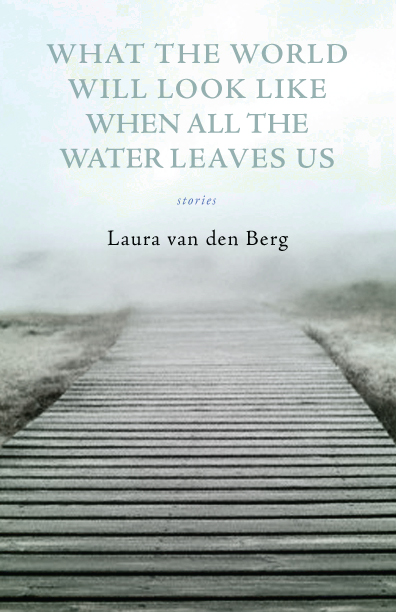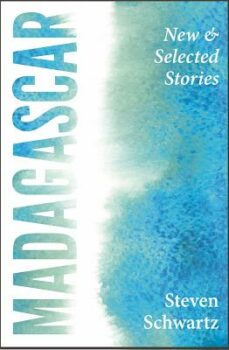
Bob Dylan turned sixty-nine today. And regardless of how you feel about the man’s music, or how you feel about the different incarnations of his work—pre/post electric, pre/post born again, pre/post Victoria’s Secret—you’ve got to give him credit for knowing how to put together an album, which is a lot different than just writing a great song.
My favorite is his 1976 album Desire. Maybe it’s the story writer in me, but the narrative quality of “Hurricane” and “Isis” and “Oh, Sister” just knock me out. More importantly, there’s a unity to the songs—in tone, in subject, in approach—that gives the entire album a sense of wholeness and progression.
 I felt this same way after reading Laura van den Berg’s collection What the World Will Look Like When All the Water Leaves Us. The stories feel “of a family,” for lack of a better phrase. Not because most involve elusive creatures and foreign locales, or because exploring and discovery are central themes in all, but because collectively the stories seem to be working toward answering the same question: How can things disappear from our lives so quickly? Whether a husband, a father, one’s health, or happiness, the world these characters inhabit has the potential to change in an instant. And there is little left to do other than sort through, sort out, and move on.
I felt this same way after reading Laura van den Berg’s collection What the World Will Look Like When All the Water Leaves Us. The stories feel “of a family,” for lack of a better phrase. Not because most involve elusive creatures and foreign locales, or because exploring and discovery are central themes in all, but because collectively the stories seem to be working toward answering the same question: How can things disappear from our lives so quickly? Whether a husband, a father, one’s health, or happiness, the world these characters inhabit has the potential to change in an instant. And there is little left to do other than sort through, sort out, and move on.
Now, dealing with the aftermath of dead parents, deserting lovers, and finished marriages is not particularly new territory to cover in a story collection. But what I found most unique in van den Berg’s work was another type of disappearance: the failure of our lives to materialize as we’d envisioned them. For some of the characters here have held a particular future for themselves so fixed in their minds for so long that when that vision fails to materialize—or takes shape in a different way than imagined—the loss is as tangible as the death of a family member.
For example, in the opening story, “Wherever We Must Be,” a young man discovers that he is dying of lung cancer. The narrator says of her friend, “it wasn’t until the hospital that he began to overcome the shock, to look ahead and weigh all that did and did not await him.” Yet instead of going to Arizona to see the Grand Canyon, he decides not to, which the narrator decides is out of fear—“of having the experience fall short, of realizing too late that he should have made a different choice. For him, it was better to not know what the Grand Canyon looked like, to retain the splendor of his dreams.”
Similarly, there is a great urgency for these characters to live a life that is meaningful and unique. As if each experience were being ticked off a celestial check list by some divine hand keeping score. Near the end of this first story, the narrator says of time, “I’ve grown to hate that word. I think of it often, how much is wasted, how freeing it would be if we weren’t always counting.” Yet these characters always are. And van den Berg’s stories do an exquisite job of catching that straining feeling—that fear that every step matters, that every missed opportunity holds the potential to irrevocably change your life, that there is a track or path for each of us and that if we’re not paying attention the future we envision for ourselves will disappear.
Yet at the same time there’s a feeling in these stories that much of life is out of our hands. In one of my favorite stories of the collection, “Inverness,” a young botanist travels to Scotland in the hope of locating a rare and endangered flower after her fiancée-to-be has unexpectedly left her. She says of her relationship:
I wondered how long he’d been planning his exit, how long other people had known about the turn my life was going to take, while I carried on, oblivious to the way things were shifting beneath me like the tectonic plates before a quake.
Poof! Our lives change. Sometimes it happens by fate, sometimes by chance, sometimes by accident, and sometimes because we expect so much from our expectations. In a beautiful moment that could summarize much of what these stories are trying to explore, the narrator of “Inverness” writes a letter to her former lover, Peter. She writes:
Today it rained. Today I found a twinflower. It was, like so many other things, not at all what I had hoped. But it is a flower and only a flower and how could I have grown to expect so much from it? Perhaps this is the origin of disappointment. When we give something more power than it could ever possibly possess.
How is it that you are already leading a different life?
I cannot say that I wish you well. Maybe one day I will.
Yet despite the way the future changes (or never occurs), these are not simply stories about young women dashed by reality who then harden themselves to the world. And despite the exquisite sadness a reader sometimes feels watching them grapple with fate and chance and their own misguided expectations, we leave this book walking away with a feeling of completeness. This comes from having been immersed in the project of an author who, like a cartographer, has set out to map a particular type of experience, to answer particular questions. Like Larry Brown’s Big, Bad, Love and Julie Orringer’s How to Breathe Underwater, like The Pugilest at Rest by Thom Jones and Interpreter of Maladies by Jhumpa Lahiri, this collection succeeds not only because of the strength of each individual story, but also because of the way that each story adds to the collective whole. Just like a good album.
To win a free copy of the book, comment on this post!
In your comment, tell FWR about a story collection you love (or one you’re looking forward to reading): on May 31, we’ll do a drawing of commenter names, and one lucky winner will receive a copy of What the World Will Look Like When All the Water Leaves Us. To be eligible, your comment must include the name and author of a story collection. Feel free, if time permits, to tell us more about the book. We look forward to hearing from you!
Learn more about how to participate in Short Story Month 2010: The Collection Giveaway Project.






